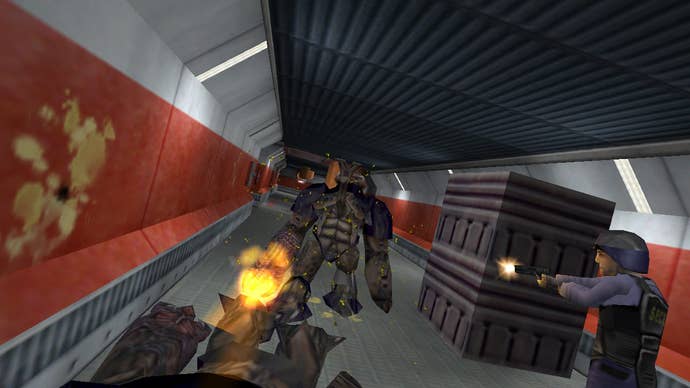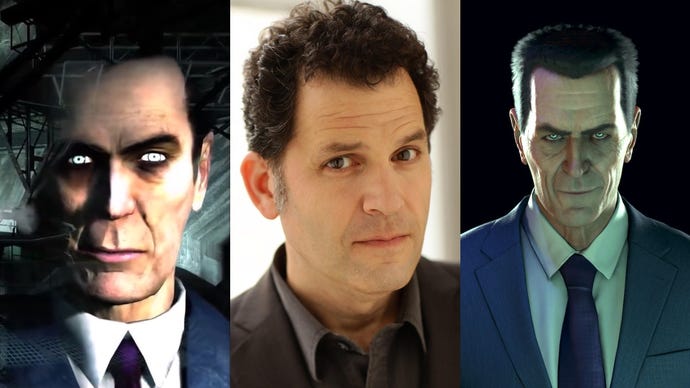Mike Shapiro, Voice of the G-Man, Says the Next Game He's in Will Be Like Seeing an Old Friend Again
Shapiro chats with USgamer about the return of Half-Life and another "blast from the past" game project that's on the way.
This article first appeared on USgamer, a partner publication of VG247. Some content, such as this article, has been migrated to VG247 for posterity after USgamer's closure - but it has not been edited or further vetted by the VG247 team.
The G-Man didn't speak in the reveal trailer for Half-Life: Alyx, and he didn't have to. One menacing look at the video's end was a fitting capper to the first new Half-Life footage seen in over a decade. Still, when it was announced shortly thereafter that Mike Shapiro would return to voice the G-Man, fans were pleased to hear it.
Shapiro has a long history of work in film, television, and theatre, but he's also a prolific voice actor for video games. From 1994's Super Punch-Out!! to background roles as San Andreas citizens in Grand Theft Auto 5, Shapiro has worked with all sorts of developers and publishers. But it's definitely his work with Valve on Half-Life—particularly the G-Man's eerie cadence and Barney Calhoun's amiable one-liners—that players know him for best.
A day after Half-Life: Alyx's release, Shapiro talks with USgamer about his decades of experience with Valve, and what he's working on now. Shapiro didn't want to say much about Half-Life: Alyx, so as to let players experience it their own way, but he did let us know about two other projects he has coming later this year: one is an immersive, interactive ASMR podcast, and the other is an unannounced video game that sounds like it could generate at or near the same level of excitement as Half-Life: Alyx.
At the start of his work on this secretive new title, Shapiro didn't even know what it was. He can't say much, but he shares just about as much he can here. To keep up with all of Shapiro's work, including some creepy G-Man messages, you can follow him on Twitter.
USgamer: So, Mike, have you had a chance to play Half-Life: Alyx yet?
Mike Shapiro: I actually had the opportunity to experience a lot of it before the release. I was amazed. I mean, I've had plenty of VR interactions, but I thought this really stepped it up, and found it disorienting in kinds of really wonderful ways.
You started doing video game roles in the nineties, years before the release of Half-Life. How has voice acting for games changed since you got into it?
Fundamentally, the gambit from the perspective of the actor is finding the character, connecting with the story, being able to develop that in collaboration with the writer and the director. One of the really neat things about Valve that I think set them apart early on was that they believed in the real importance of the story, of storytelling, and of vesting these characters with not just a bunch of... there were a lot of games where they'd say "now give me five different screams, great, now give me five different laughs, great" and "we'll cover the lines, it's just a cutscene"—because really, it's about the FPS stuff.
I did plenty of those games and enjoyed them. They were very successful, and that's awesome, but I have always found most satisfying the games—of which I think Half-Life is archetypal—that say the more we know about these characters, the more we connect with what's going on for them. The more we're able to get inside G-Man's head, the more we'll enjoy the game.
So, starting with this kind of pixelated version, using that as an example of what G-Man looked like in 1998, compared to how he looks now? [This] certainly wasn't happening in the nineties—the amount of motion capture, and now VR is more prevalent—these just absolutely make it a more intimate experience of conjuring these characters.
Did you do any performance capture or reference footage for Alyx?
I can talk about projects that I've worked on in the last couple years. I can't speak specifically about the development process for Half-Life: Alyx, it's too early for that. [There's] a different project that I worked on last summer and fall, which involved a considerable amount of motion capture. What's interesting to me in that is you won't see my face, but you'll see every gesture and emotional inflection, physical inflections, and then they'll map it, obviously. I mean, they put a million dots on my face. The knowledge that you've got that much nuance to work with, to say nothing of the fact that you have the actual physicality, is really neat.
I was working on that game for quite a while before I knew [what it was]. There was a rehearsal and some recordings, and after one of the recording sessions I was having a drink with the director. He told me what the game was, and nobody knows that this is coming.
I'll announce it on my Twitter feed when I'm allowed to—I'm trying to be circumspect even as I speak with you about it—but this is going to be such a mindblowing re-up from what people have come to know. It's going to really... it's going to make people have a complete re-understanding of what they thought they knew about the story in the game prior to it, and I don't even know if people are expecting it. It's going to be kind of a blast from the past.
Is there anything else you can say about this "blast from the past" project, perhaps comparing it to the fervor for Half-Life: Alyx, or maybe lowering people's expectations for something on the level of "the second coming?"
Where would you put Half-Life: Alyx in terms of the second coming?
Well, some people are upset that there's not a "3" on it, but it's pretty close. Is this in the same ballpark as a new Half-Life game?
I hear your question, and I want to honor it, but I want to be true to my commitments to not spoil surprises. Do you have a buddy you haven't seen in a long time, and you barely think you'll see that person again, maybe?
Yeah. You'd say it's like that, then?
Then if that person were to show up, you'd be like "oh man, that's awesome." I think that's probably more than [I can say].
Maybe you can't talk about working with writers Erik Wolpaw, Sean Vanaman, and Jay Pinkerton on Half-Life: Alyx [Editor's note: Wolpaw tells USG that Shapiro "was amazing" in their G-Man recording sessions], but do you have any favorite memories of working with former series writer Marc Laidlaw?
From early on and continuing into [Half-Life 2], there was a real pleasurable experience of an exchange on both sides of the glass. You'd get your lines and [for] both Barney and G-Man, I think I saw some early sketches. They may actually have been pencil sketches, but that's always a big starting point, seeing them, and that's why the artists at Valve are so much a part of the process of crafting these characters.
One of the notable things early on, working on this with Laidlaw—and there was another guy, Bill Van Buren, who was really important in those days—you'd get this feedback loop where you'd record what's in the script, and then they'll say "are you hearing anything different? Do you think G-Man might say it differently?" I'd often have my eyes closed, and I'd open my eyes after I finished, look up through the booth, and their arms are waving in the air, like "we landed it." Often I'd also say "gimme one more of those," like you're talking to a film director to get one more take, because you know their time is limited and you need to move on. [Marc and Bill] were great, and oftentimes that's the moment, particularly with G-Man, where you find a sort of... I don't know what to call it. A malicious twinkle in his eye?
For me, it's expressed in the cadence, the tempo, the inflections; he gives almost the whole sentence, then he drops it away. That music is a big part of it for me, particularly with a character like the G-Man. Although, Barney has a whole different thing going on, but he's got a melody to him that I consider so warm. I want my damn beer! But Barney's got your back, even if he never makes good on that promise.

Do you have a favorite between playing Barney and G-Man?
I really enjoy being both of those guys, they're so different.
What do you make of the G-Man's lack of interest in Barney? In Half-Life: Blue Shift, he's not hired by the G-Man like Gordon Freeman was, or put in limbo by him as was the case with Adrian Shepard in Half-Life: Opposing Force.
Well, do we know that? Do we know that G-Man hasn't played a role in what happens in Blue Shift? Yeah, I'm curious that you're convinced that G-Man didn't have an influence in that narrative. That's interesting, Mathew, that that's the conclusion you've drawn.
Fair enough! In the first Half-Life game, the G-Man's role is very ambiguous, and in the second we get a better sense that he is not of this world. Have you always had a sense about where the G-Man's coming from, or what his motives and origins are? Or is that something you carry for yourself just as ideas to help find the voice?
I know a lot about G-Man that I'm not at liberty to say, and that I haven't had a chance to convey. There's a considerable amount of information about him, and some of it is directly from the creators of the character, the writers, and some of it is an actor's discovery over the course of portraying.
For more on Half-Life: Alyx, check out our review and read our extended two-part interview with developers Erik Wolpaw and Chris Remo. Also, be sure not to miss our spoiler-lite guide to some of Alyx's best easter eggs and callbacks.
This interview has been edited for clarity and length. Header image photo of Mike Shapiro courtesy of Defiant Public Relations.


